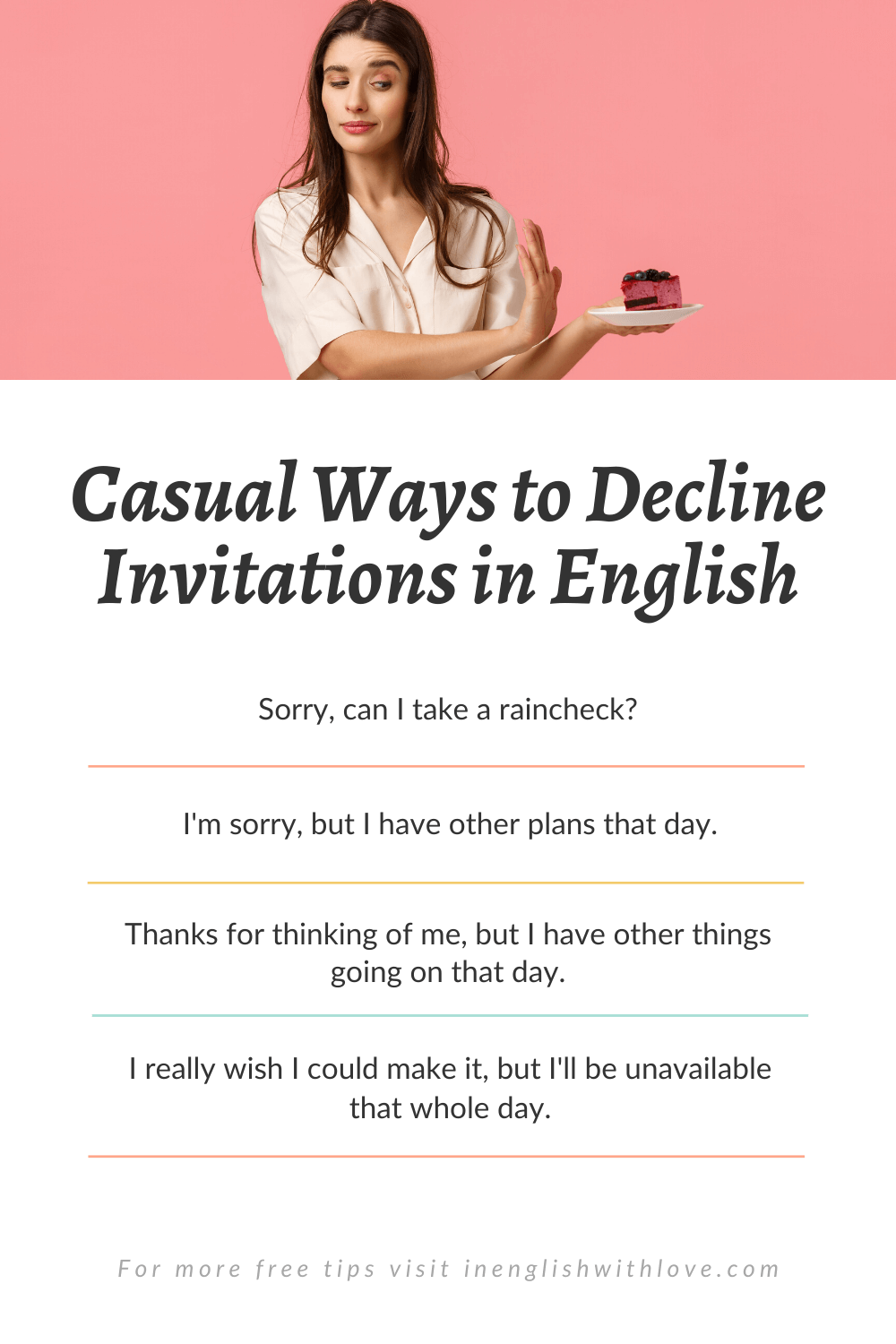Ever been in that awkward spot where you really wanna say no to an invite, but you’re not sure how to do it without making things weird? Well, buckle up, because we’re diving deep into the art of politely declining invitations. Whether it’s a party, work event, or even a casual hangout, learning how to refuse an invitation politely is a skill that’ll save your relationships and your sanity. Let’s get real—saying no doesn’t have to be stressful, and it certainly doesn’t have to hurt feelings. So, let’s break it down!
Look, life gets busy, and sometimes you just can’t make it to every event that comes your way. But here’s the kicker: people don’t hate you for saying no. What they hate is when you handle it poorly. That’s why mastering the art of politely refusing invitations is a game-changer. It’s about being respectful, honest, and considerate—all while still prioritizing your own needs and boundaries.
Now, don’t sweat it if you’re not sure where to start. This guide will walk you through everything you need to know about how to refuse an invitation politely. From crafting the perfect response to understanding the psychology behind rejection, we’ve got your back. So, let’s make this awkward situation a little less… well, awkward.
Read also:Donna Cruz And Husband A Closer Look Into Their Love Story Journey And Life Together
Table of Contents
- Why It Matters: The Importance of Saying No Politely
- Common Scenarios: When You Need to Decline
- Biography: The Psychology Behind Rejection
- Step-by-Step Guide: How to Refuse an Invitation Politely
- Verbal vs. Written Responses: Which Works Best?
- Maintaining Long-Term Relationships After Saying No
- Tips and Tricks for Smoother Refusals
- Frequently Asked Questions
- Conclusion: Mastering the Art of Polite Refusal
- References
Why It Matters: The Importance of Saying No Politely
Alright, let’s talk about why this whole “polite refusal” thing is such a big deal. Sure, you could just ghost someone or send a vague excuse, but let’s be honest—that’s not cool. When you refuse an invitation, you’re not just rejecting the event; you’re also navigating a social interaction that affects your relationship with the person who extended the invite. And yeah, that’s a lot of pressure, but trust me, it’s worth getting right.
Saying no politely shows respect for the other person’s time and effort. It communicates that you value their invitation, even if you can’t attend. Plus, it helps you maintain healthy boundaries and prioritize your own needs without damaging your relationships. Let’s face it—people are more likely to invite you again in the future if you handle the situation gracefully.
Common Scenarios: When You Need to Decline
Before we dive into the nitty-gritty of how to refuse an invitation politely, let’s take a look at some common scenarios where you might find yourself needing to say no. Understanding these situations can help you prepare for how to handle them effectively.
Scenario 1: Work Events
Work events can be tricky. You don’t want to seem uninterested or uncommitted, but sometimes you genuinely can’t make it. Whether it’s a networking dinner, team-building retreat, or office birthday party, declining a work-related invite requires a bit of finesse.
Scenario 2: Social Gatherings
From weddings to birthday parties, social gatherings are all about celebration. But what happens when you can’t attend? Whether it’s because of scheduling conflicts or personal reasons, refusing a social invitation politely is key to keeping friendships intact.
Scenario 3: Casual Hangouts
Let’s not forget those last-minute invites from friends or acquaintances. While it’s great to be spontaneous, there are times when you just need to focus on yourself or other commitments. Knowing how to say no without hurting feelings is essential here.
Read also:Elsie May Larson Kunkel The Untold Story Of An Influential Figure
Biography: The Psychology Behind Rejection
Before we move on, let’s take a quick detour into the psychology of rejection. Why do people react the way they do when someone declines an invitation? It all comes down to human nature. We’re social creatures, and invitations often carry an emotional weight. When someone says no, it can feel like a personal rejection, even if it’s not meant that way.
Here’s a quick breakdown:
- Emotional Response: People might feel hurt or offended because they perceive the refusal as a lack of interest in their friendship or event.
- Self-Esteem: Hosting an event can be a big deal, and a decline might make the host question whether they’re doing something wrong.
- Expectations: Sometimes, people expect a certain level of participation from others, and a refusal can disrupt those expectations.
Understanding these factors can help you tailor your response to minimize any negative feelings. It’s all about empathy and communication.
Step-by-Step Guide: How to Refuse an Invitation Politely
Now that we’ve covered the basics, let’s dive into the actual process of refusing an invitation politely. Here’s a step-by-step guide to help you navigate this tricky situation:
Step 1: Respond Promptly
One of the biggest mistakes people make is waiting too long to respond. If you know you can’t attend, it’s best to let the host know as soon as possible. This gives them time to adjust their plans and shows that you respect their effort.
Step 2: Express Gratitude
Always start by thanking the host for the invitation. This sets a positive tone and shows that you appreciate their thoughtfulness. For example, you could say, “Thank you so much for inviting me to your event!”
Step 3: State Your Reason
Be honest about why you can’t attend, but keep it concise. You don’t need to go into every little detail, but offering a brief explanation can help soften the blow. For instance, you might say, “Unfortunately, I have a prior commitment that day.”
Step 4: Offer Alternatives
If possible, suggest an alternative way to connect with the host. This shows that you still value the relationship. You could say something like, “Let’s catch up soon—I’d love to grab coffee sometime!”
Step 5: End on a Positive Note
Wrap up your response with a friendly closing. Reiterate your gratitude and express hope for future opportunities to attend similar events. For example, “Thanks again for thinking of me, and I hope we can catch up soon!”
Verbal vs. Written Responses: Which Works Best?
When it comes to refusing an invitation, the method of communication matters. Here’s a quick rundown of when to use verbal or written responses:
Verbal Responses
Verbal responses are great for casual hangouts or close friends. They allow you to explain your reasons in person and gauge the other person’s reaction. Just make sure to keep it polite and respectful. For example:
- “Hey, I really appreciate the invite, but I’m afraid I can’t make it this time.”
- “Thanks so much for asking, but I’ve got something else going on that day.”
Written Responses
Written responses are ideal for formal events or situations where you want to leave a paper trail. They give you time to craft a thoughtful and polite message. For example:
- “Thank you so much for inviting me to your event. Unfortunately, I have a prior commitment that day, but I hope we can catch up soon!”
- “I’m so grateful for the invitation, but I won’t be able to attend. Let’s plan something else in the future!”
Maintaining Long-Term Relationships After Saying No
One of the biggest concerns people have when refusing invitations is whether it will damage their relationships. The good news is that it doesn’t have to. As long as you handle the situation with care and consideration, your relationships can remain strong—or even improve.
Here are a few tips for maintaining long-term relationships after saying no:
- Follow Up: If you miss an event, send a quick message afterward to show that you care. A simple “I’m so sorry I couldn’t make it—hope you had a great time!” goes a long way.
- Stay Connected: Keep in touch with the host or attendees in other ways. Send them a text, call them, or invite them to something else in the future.
- Be Reliable: If you say you’ll attend an event, make sure you actually show up. Consistency builds trust and strengthens relationships.
Tips and Tricks for Smoother Refusals
Here are some additional tips and tricks to help you refuse invitations politely:
- Be Honest: People respect honesty, so don’t make up excuses. If you’re too busy or just not interested, say so in a polite way.
- Keep It Short: You don’t need to write a novel. A brief, polite response is usually enough.
- Avoid Over-Explaining: While it’s okay to give a reason, don’t go into excessive detail. Keep it simple and to the point.
- Practice Gratitude: Always express gratitude for the invitation, even if you can’t attend.
Frequently Asked Questions
Let’s tackle some common questions about how to refuse an invitation politely:
Q: What if I change my mind after saying no?
A: If you change your mind, it’s perfectly okay to let the host know. Just send a polite message explaining that you’re now available to attend. For example, “Hey, I just wanted to let you know that my schedule has opened up, and I’d love to attend your event if there’s still room!”
Q: Should I offer a reason for declining?
A: It’s not necessary to provide a reason, but doing so can help soften the blow. Just keep it short and honest. For example, “I have a prior commitment” or “I’m feeling a bit overwhelmed with work right now.”
Q: Can I suggest someone else attend in my place?
A: Only if the host explicitly allows it. Some events have specific guest lists, so it’s best to check with the host before suggesting a replacement.
Conclusion: Mastering the Art of Polite Refusal
Learning how to refuse an invitation politely is a skill that will serve you well in both personal and professional settings. By being respectful, honest, and considerate, you can say no without burning bridges or hurting feelings. Remember, it’s okay to prioritize your own needs and boundaries—just do it in a way that shows you value the other person’s effort and relationship.
So, the next time you find yourself in that awkward spot, take a deep breath and use these tips to navigate the situation with grace. And hey, don’t forget to hit the share button if you found this guide helpful!
References
1. Psychology Today. (2021). The Science of Rejection: Why It Hurts So Much. Retrieved from [psychologytoday.com]
2. Harvard Business Review. (2020). How to Say No Politely at Work. Retrieved from [hbr.org]
3. Forbes. (2019). The Art of Saying No Without Burning Bridges. Retrieved from [forbes.com]


